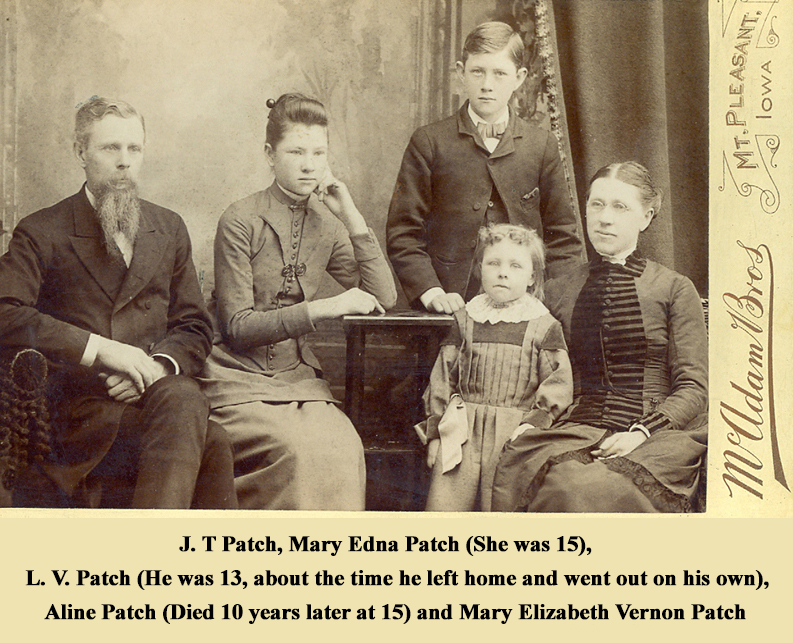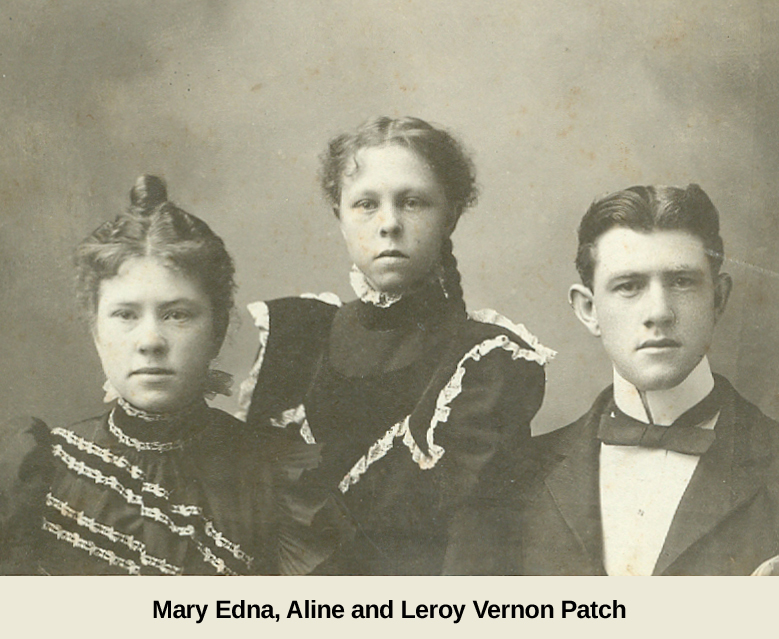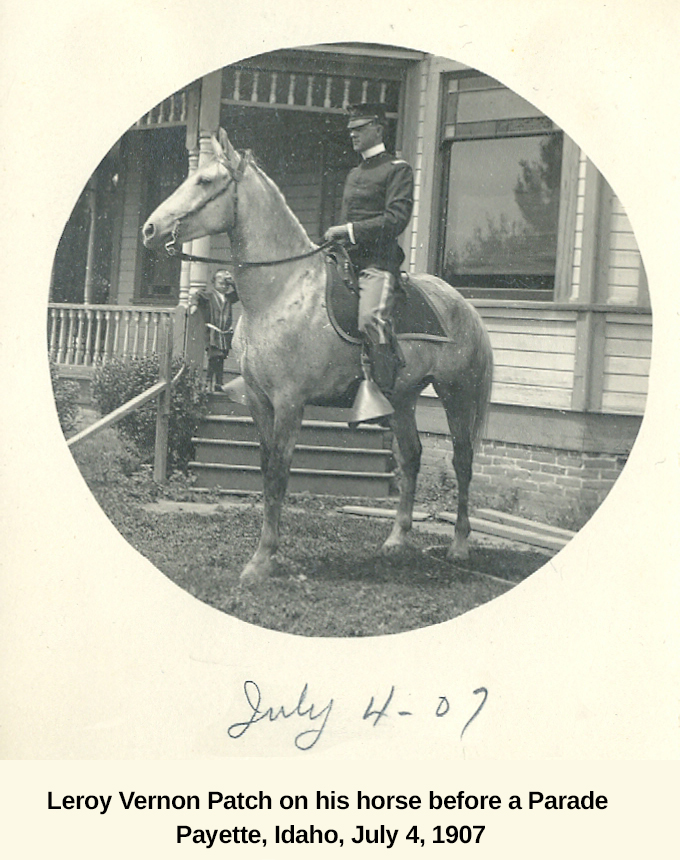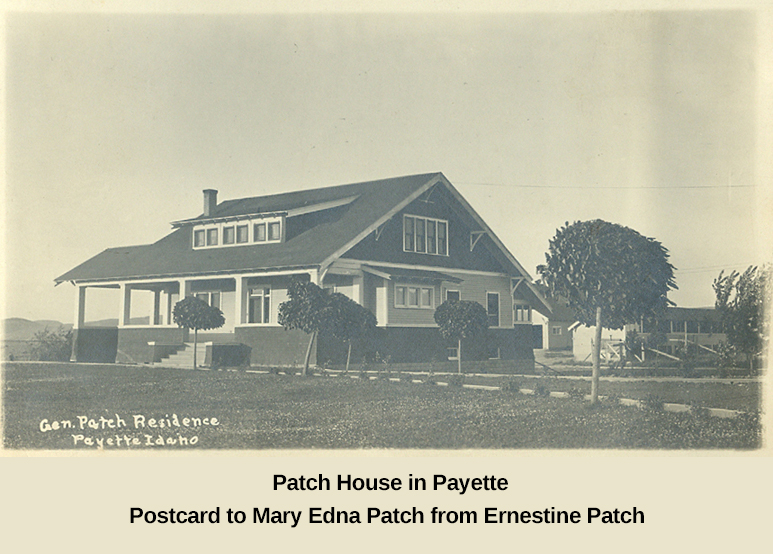
A resident of Payette valley, Idaho, since 1902, Mr. Patch was among the men responsible for the introduction of modern methods of fruit growing in this valley, is now owner of one thousand acres of irrigated land in this section, and has splendid orchards, raises some of the finest horses and thoroughbred dogs produced anywhere and is officially connected with a number of large business concerns in Payette and vicinity. Although Mr. Patch began his career with the advantages of a liberal education and excellent early training, he was neither a child of wealth nor of poverty, and has really accomplished his exceptional success through his own energy and ability. He was one of the men who refused to see or consider the obstacles which lay in his course, and from his record it would seem that he has marched steadily and straightforward to his goal.
A son of Joseph T. and Mary (Vernon) Patch, he was born at Mt. Pleasant, Iowa, October 14, 1876. The father was born in Vermont and as a young man emigrated to Iowa, where he became an attorney of prominence and distinction. He lived in Mount Pleasant for ten years, thence moving to Omaha, Nebraska, where he was in the practice of law for twenty years. In 1905, he came to Payette and resided with his son until his death in 1911, at the age of seventy-three years. The mother was a native of Iowa, and her death occurred in Omaha at the age of forty-two in 1896. There were three daughters and one son in the Patch family, Le Roy V. being the third in the family.
After completing the work of the public schools of Omaha, Le Roy V. Patch matriculated as a student in the University of Nebraska, where he was graduated in 1898 with the degree of Bachelor of Arts. During the following two years he was a teacher in the horticultural department of that university, and from 1900 to 1902 was superintendent of schools at Bartley and Kearney, Nebraska.
On coming to Payette, Idaho, in 1904, Mr. Patch bought a fruit ranch, on which he installed the first pumping plant brought into this valley. This pump was of twenty-eight horse power and had sufficient capacity to water a tract of fifty acres. With increase of land under his control and extension of business, Mr. Patch has kept his facilities and apparatus up to the highest standard, and is one of the most progressive men in the fruit and general ranching industry of Idaho.
At the present time Mr. Patch owns and operates one thousand acres of the finest orchard land anywhere in the Northwest, and makes a specialty of raising high grade fruits. He is part owner of another fruit ranch of seven hundred and twenty acres and it secretary and manager of the Idaho Canning Company, a concern which employs a force of one hundred and twenty men and women during the busy season. A special feature of his ranch are his extensive poultry establishment and kennels. He has five hundred thoroughbred poultry and twenty-five different breeds, and a number of thoroughbred dogs, including pet bulls, Boston bulls and English bulldogs. It is claimed that he has the finest pack of Russian wolf hounds in the Northwest. He also raises a number of registered horses and cattle.
Mr. Patch was one of the promoters of the High Line Canal, which waters the entire Payette valley, and he is president of the High Line Canal Company. He is also president of the Payette-Heights Irrigation Company, which pumps water the highest of any concern of its kind in the state. Its machinery elevates water to ditches and fields to a height of one hundred and fifty-eight feet above the source of supply. Mr. Patch is vice-president of the Payette Land & Orchard company, is a director in the First National Bank of Payette, and a director in the Payette Building & Loan Association. He built the Patch Co-operative Canal, is the director in the Payette Valley Fruit Packing Company, and a director in the southern Idaho League of Commercial Clubs.
At the present time Mr. Patch is adjutant general and chief of staff of the state of Idaho under Governor Haines, and he has been active in military affairs for the past fifteen years. He was recruiting officer during the Spanish-American war, and was lieutenant of company A, Nebraska National Guard, in 1900. In Idaho he has held the offices of captain, major, lieutenant-colonel, colonel and brigadier general, and finally his present position. He has served on the staffs of Governor Gooding and Governor Brady. In politics his stalwart Republicanism has made him an influential factor in political affairs, and he was a member of the tenth session of the state legislature. Fraternally he is affiliated with the Benevolent and Protective Order of Elks, the Improved Order of Red Men, the Kappa Sigma college fraternity, and in the time-honored Masonic order he has passed through all the official chairs and is a member of the Ancient Arabic Order of the Nobles of the Mystic Shrine. He takes great pleasure in all out-of-door sports, and is a member of the Rod & Gun Club and of the Payette Lakes Club, being a member of the board of directors of the last named club. Facts speak for themselves, and in view of the foregoing it is unnecessary to dwell upon the prominence and influence of General Patch in Idaho. Suffice it to say that he is a man of sterling integrity, and one whose business dealings have all been characterized by fair and honorable methods.
At Kearney, Nebraska, in May, 1901, General Patch married Miss Ernestine Tabor, a daughter of E. W. Tabor, a stock broker of Chicago. They are the parents of four children as follows; Vernon, born in 1902, and now attending school in Payette; Ernest, born in 1904, also in school; Alleston, born in 1907, and Oliver, born in 1909.




